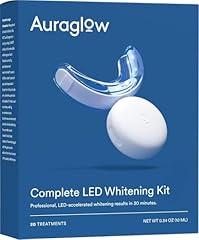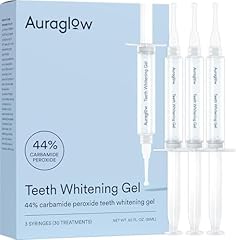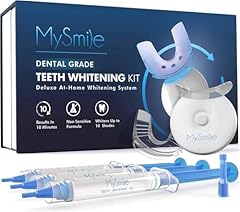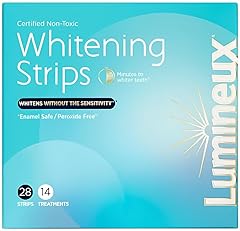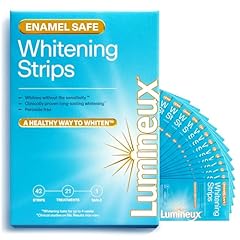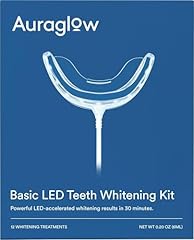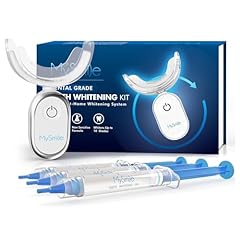-
1
Best Overall LED light accelerates whitening process efficiently.
LED light accelerates whitening process efficiently. 20+ treatments offer great value and longevity.
20+ treatments offer great value and longevity. Easy-to-use syringes ensure precise application.
Easy-to-use syringes ensure precise application. -
2
 High concentration for effective whitening results.
High concentration for effective whitening results. Includes 30 treatments for extended use.
Includes 30 treatments for extended use. Convenient syringe design for easy application.
Convenient syringe design for easy application. -
3
 Quick 10-minute whitening sessions.
Quick 10-minute whitening sessions. Non-sensitive formula for comfortable use.
Non-sensitive formula for comfortable use. Effective on stains from various sources.
Effective on stains from various sources. -
4
 Gentle on sensitive teeth, no irritation.
Gentle on sensitive teeth, no irritation. Made with non-toxic, safe ingredients.
Made with non-toxic, safe ingredients. Easy to apply, mess-free usage.
Easy to apply, mess-free usage. -
5
 Gentle, peroxide-free formula for sensitive teeth.
Gentle, peroxide-free formula for sensitive teeth. Dentist formulated and certified non-toxic.
Dentist formulated and certified non-toxic. Provides whitening without causing sensitivity.
Provides whitening without causing sensitivity. -
6
Best Affordable LED light speeds up whitening process
LED light speeds up whitening process High-concentration 35% carbamide peroxide gel
High-concentration 35% carbamide peroxide gel Convenient, easy-to-use syringe applicators
Convenient, easy-to-use syringe applicators -
7
Popular 40,000 VPM motor for effective cleaning.
40,000 VPM motor for effective cleaning. Comes with 8 replacement brush heads.
Comes with 8 replacement brush heads. Travel case included for easy portability.
Travel case included for easy portability. -
8
 Convenient prefilled trays for easy application.
Convenient prefilled trays for easy application. Effective 15% hydrogen peroxide formula.
Effective 15% hydrogen peroxide formula. Refreshing mint flavor enhances user experience.
Refreshing mint flavor enhances user experience. -
9
 Professional-level whitening results at home.
Professional-level whitening results at home. Easy to apply and stays in place.
Easy to apply and stays in place. Noticeable difference in just a few uses.
Noticeable difference in just a few uses. -
10
Hot Deal LED light speeds up whitening process.
LED light speeds up whitening process. Safe for enamel and sensitive teeth.
Safe for enamel and sensitive teeth. Quick 10-minute application time.
Quick 10-minute application time.
Overview of Teeth Whitening
We all know that a beaming smile can light up a room and make a lasting impression. However, for those of us who enjoy our daily espresso or a glass of red wine, maintaining that pearly white shine can be quite a challenge. Enter teeth whitening, the hero of our story! This marvel of modern dental care is designed to combat those stubborn stains and restore your teeth to their dazzling best. We've delved deep into the world of teeth whitening, examining the science, assessing the effectiveness, and considering the comfort factor. All of this meticulous research has been conducted with one goal in mind: to help you navigate the vast sea of teeth whitening options out there. We've whittled down the candidates to our top picks, each one catering to a different need, whether you're after speed, budget-friendliness, or ease of use. So, sit back, relax, and let us guide you towards a brighter, whiter smile.Top Teeth Whitening
• AURAGLOW Teeth Whitening Kit with LED Light• Auraglow Teeth Whitening Gel Refill Pack, 44% Carbamide Peroxide• MySmile Teeth Whitening Kit with LED LightFAQ
Q: Can teeth whitening damage my enamel?
A: When done correctly, teeth whitening should not damage your enamel. However, some people may experience sensitivity during or after the procedure. It's important to follow the instructions provided by your dentist or use a reputable at-home whitening kit to minimize any potential damage.
Q: How often should I whiten my teeth?
A: This depends on the method of teeth whitening you choose. In-office whitening can last up to a year, while at-home kits may need to be used every few months. It's important to follow the instructions provided by your dentist or the manufacturer to avoid overuse or damage to your teeth.
Q: Can I whiten my teeth if I have sensitive teeth?
A: Yes, but it's important to use a product specifically designed for sensitive teeth. These products typically contain lower concentrations of the whitening agent and can be used more frequently without causing discomfort.
Q: What are the most common types of teeth whitening?
A: The most common types of teeth whitening are in-office whitening, at-home whitening kits, and whitening toothpaste. In-office whitening is the most effective but also the most expensive, while at-home kits and toothpaste are more affordable but may take longer to see results.
Q: Are there any side effects to teeth whitening?
A: The most common side effect of teeth whitening is temporary sensitivity to hot or cold temperatures. Some people may also experience gum irritation or white spots on their teeth. These side effects are typically mild and go away on their own within a few days.

